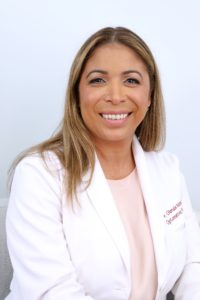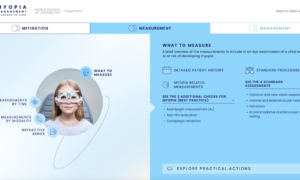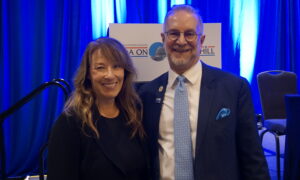February 15, 2024
By Glenda Aleman, OD
Transparency can establish trust when talking to patients and parents about off-label treatments. I don’t find anything to be redundant or that there’s too much information. The more detail you can offer, the more confident parents will feel with you treating their child.
As eye care practitioners, we prescribe off-label treatments to our patients every day. Often, when I talk to my colleagues about what their limitations are when it comes to treating myopia, one of their concerns is that they don’t want to prescribe treatments that aren’t approved by the U.S. Food and Drug Administration (FDA). Yet, we are all prescribing other treatments that are off-label on a daily basis.
I think there’s an essential need for more doctors to feel comfortable prescribing and using myopia treatment options off-label — especially because the benefits of the treatments outweigh the risks. As clinicians, we shouldn’t let pending FDA approvals stop us from doing everything we can to help our patients.
Talking to Parents About Off-Label Treatments
In my practice, I had an interesting experience prescribing off-label myopia treatments and talking to parents about informed consent. I had a 14-year-old male patient come into my office specifically requesting orthokeratology treatment. When he came in for his exam, his mother had many questions, particularly about the safety of OrthoK and how the treatment worked. She seemed to be disturbed by the idea of her son sleeping in lenses when she had been told her whole life never to sleep in contact lenses. I was able to answer all her questions, and she was satisfied with my responses.
At the end of the conversation, she asked me what specific lens I would fit her son with. Not knowing that she was a lawyer, I told her I was going to use the OrthoK lens that has received FDA approval for the temporary correction of myopia and myopia management. She again asked why that was my choice. I explained that while I have a variety of OrthoK lenses available, her son’s prescription meets the criteria of the FDA-approved lens, so that would be my first choice. She was adamant that she wouldn’t have it any other way.
This led to an interesting conversation with this patient’s mother about prescribing treatments off-label. I explained that there are many instances where the FDA-approved treatment is not the best or even appropriate treatment for a patient. Some patients’ prescriptions don’t fit the parameters of certain lens designs, and I have to use a different design with a wider range because that is the best option for the patient. This also seemed to be a sufficient response, as the patient’s mother, who then revealed that she was a lawyer, agreed that the patient’s individual needs should dictate their treatment.
What Do Parents Think of Informed Consent?
With this particular patient and his mother, she recommended that I adopt an informed consent policy as a means of giving myself some protection should something go wrong with treatment.
I’ve used informed consent since I first started practicing optometry. In my first job in optometry, I worked in New York City, and the owner of the practice used informed consent in her office, and she emphasized the importance of having a signed document. When I opened my practice, I followed that same protocol and had a form for parents to sign from the moment I started offering myopia management treatments.
I explained to the patient’s mother that I use every myopia management treatment that’s currently available — low-dose atropine, OrthoK, and soft multifocal contact lenses. The majority of the treatments I use are off-label for myopia management, and I explain that to my patients and their parents every day. When the exam was over, she asked if she could have a copy of my informed consent to review from a legal standpoint. She emailed me a few days later, saying that my informed consent was solid, and I took the opportunity to ask her if she would’ve gone through with the OrthoK treatment for her son if I had chosen an off-label lens. She quickly replied: “I wouldn’t.”
While this is just one parent’s opinion and experience, clinicians need to understand this perspective. I’d encourage other ODs to use informed consent because when it comes to one-on-one with the patient and their parents, the parents do want to have that information, and they want to understand the benefits and the risks of the treatment. Though we’re not required by law to have an informed consent document or to disclose to patients if we’re using an off-label treatment, doctors are obligated to share as much information as possible with patients.
What Goes into an Informed Consent Document?
The first thing I include in my informed consent form is a description of the treatment and how it works. Then, I highlight the treatment we’re using for that particular child and that it’s off-label. I proceed to outline the possible risks or side effects to be aware of while the child is in the treatment, the contraindications of the treatment, and the potential limitations. The document also includes my commitment to them as a physician, that I will always make sure that I’m available to see my patients in case of an emergency or that a qualified physician will be available to see them. Then, I talk about the patient’s commitment to treatment and what happens if the patient decides to discontinue the treatment. I also go over their payment and overall cost of treatment, which isn’t entirely necessary, but this form serves as a contract as well as an informed consent agreement.
Transparency is Key
I think transparency can establish trust when talking to patients and parents about off-label treatments. I don’t find anything to be redundant or that there’s too much information. The more detail you can offer, the more confident parents will feel with you treating their child.
Though my informed consent form is very comprehensive and detailed and a legal document, I try to make the experience as conversational and soft as possible so it doesn’t feel like a transaction. I want parents to know that I am concerned about them and their child, and I’m doing this in the child’s best interest — not so much to protect myself. I want them to fully understand anything that could happen, and I am signing here also, saying that I am responsible for taking care of your child and making sure that everything goes well during the treatment.
Everything related to informed consent is handled after the exam. After I complete my clinical assessment, we go to a separate room, which I think helps to separate the legal and financial aspects from the clinical procedures. Usually, my first reaction from a parent is a little apprehension. Once I explain to them what everything means and I go over why I chose that treatment for their child, they relax.
I would encourage other physicians not to let off-label treatments keep them from treating patients. We have a clinical duty to use the best available treatments that will have the most positive effect on the patient. We should focus more on these treatments’ benefits because they definitely outweigh the risks.
 |
Dr. Aleman received her Bachelor of Science in Vision Science and Doctor of Optometry from Nova Southeastern University (NSU). She is the founder and CEO of iSmart Vision Care in Miami, Florida. In her mission to fight the myopia epidemic, Dr. Aleman has launched her new venture, OK Love Myopia Control Experts, a clinic and consulting company. She has lectured extensively nationally and internationally to contribute to educating others in orthokeratology and myopia management. Dr. Aleman is a myopia management professional affairs consultant for several companies, including Johnson and Johnson Vision and Topcon. Additionally, she has held the role of clinical liaison for Walmart Health Optometry in Florida, she serves on the advisory committee of the American Academy of Orthokeratology and Myopia Control (AAOMC), and she is a former lead ambassador for the Optometry Divas Miami Chapter. Dr. Aleman is a founding board member of Latinos En Optometry and the new organization Women In Eyecare. To contact Dr. Aleman, email her at gmoheep@gmail.com |














